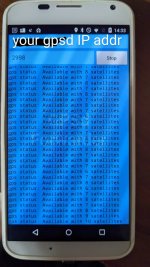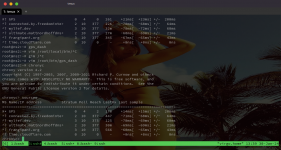DonZalmrol
Dabbler
- Joined
- Oct 6, 2021
- Messages
- 14
So, today they've came by to install a new digital energy meter for my home. Had to turn everything off and after booting up, I've noticed that my Truenas is no longer syncing with NTP, nor is it in my Windows active directory domain. When I try to re-join manually I receive the following fancy message
Now I had this error before and it went away after restarting my NTP service, however now it seems to be stopping after a few seconds...
timedatectl output:
systemctl status ntp output:
When I start the service again, I notice the "kernel reports TIME_ERROR: 0x41: Clock Unsynchronized" error message:
It seems that my TrueNAS is not using the BIOS (CMOS) time nor using NTP.
My configured NTP servers are my domain controllers, I also tried with reverting back to the default NTP servers provided by IXSystems/Linux.
What I tried:
My specs:
Time offset from Active Directory domain exceeds maximum permitted value. This may indicate an NTP misconfiguration.
Now I had this error before and it went away after restarting my NTP service, however now it seems to be stopping after a few seconds...
timedatectl output:
Local time: Fri 2023-04-14 23:30:26 CEST
Universal time: Fri 2023-04-14 21:30:26 UTC
RTC time: Fri 2023-04-14 21:30:27
Time zone: Europe/Brussels (CEST, +0200)
System clock synchronized: no
NTP service: n/a
RTC in local TZ: no
systemctl status ntp output:
ntp.service - Network Time Service
Loaded: loaded (/lib/systemd/system/ntp.service; enabled; vendor preset: enabled)
Active: failed (Result: exit-code) since Fri 2023-04-14 23:14:11 CEST; 14min ago
Docs: man:ntpd(8)
Process: 51314 ExecStart=/usr/lib/ntp/ntp-systemd-wrapper (code=exited, status=0/SUCCESS)
Main PID: 51319 (code=exited, status=255/EXCEPTION)
CPU: 82ms
Apr 14 23:14:04 GRE-NAS-03 ntpd[51319]: Listen normally on 49 veth448737ad [fe80::c48b:2dff:fe34:a4fb%32]:123
Apr 14 23:14:04 GRE-NAS-03 ntpd[51319]: Listen normally on 50 vethbfcd679c [fe80::f02e:2bff:fef5:8188%33]:123
Apr 14 23:14:04 GRE-NAS-03 ntpd[51319]: Listen normally on 51 vethda915bbb [fe80::f425:aaff:fe8b:155b%34]:123
Apr 14 23:14:04 GRE-NAS-03 ntpd[51319]: Listen normally on 52 vethd864b194 [fe80::58d2:15ff:fe56:58c7%35]:123
Apr 14 23:14:04 GRE-NAS-03 ntpd[51319]: Listening on routing socket on fd #69 for interface updates
Apr 14 23:14:04 GRE-NAS-03 ntpd[51319]: kernel reports TIME_ERROR: 0x41: Clock Unsynchronized
Apr 14 23:14:04 GRE-NAS-03 ntpd[51319]: kernel reports TIME_ERROR: 0x41: Clock Unsynchronized
Apr 14 23:14:04 GRE-NAS-03 systemd[1]: Started Network Time Service.
Apr 14 23:14:11 GRE-NAS-03 systemd[1]: ntp.service: Main process exited, code=exited, status=255/EXCEPTION
Apr 14 23:14:11 GRE-NAS-03 systemd[1]: ntp.service: Failed with result 'exit-code'.
When I start the service again, I notice the "kernel reports TIME_ERROR: 0x41: Clock Unsynchronized" error message:
● ntp.service - Network Time Service
Loaded: loaded (/lib/systemd/system/ntp.service; enabled; vendor preset: enabled)
Active: active (running) since Fri 2023-04-14 23:29:36 CEST; 1s ago
Docs: man:ntpd(8)
Process: 206307 ExecStart=/usr/lib/ntp/ntp-systemd-wrapper (code=exited, status=0/SUCCESS)
Main PID: 206312 (ntpd)
Tasks: 2 (limit: 154012)
Memory: 1.4M
CPU: 80ms
CGroup: /system.slice/ntp.service
└─206312 /usr/sbin/ntpd -p /var/run/ntpd.pid -c /etc/ntp.conf -u 114:119
Apr 14 23:29:36 GRE-NAS-03 ntpd[206312]: Listen normally on 47 vetha0eaf602 [fe80::145c:dbff:fed1:bb0e%30]:123
Apr 14 23:29:36 GRE-NAS-03 ntpd[206312]: Listen normally on 48 vetha1e190fb [fe80::c15:3eff:fe7f:9433%31]:123
Apr 14 23:29:36 GRE-NAS-03 ntpd[206312]: Listen normally on 49 veth448737ad [fe80::c48b:2dff:fe34:a4fb%32]:123
Apr 14 23:29:36 GRE-NAS-03 ntpd[206312]: Listen normally on 50 vethbfcd679c [fe80::f02e:2bff:fef5:8188%33]:123
Apr 14 23:29:36 GRE-NAS-03 ntpd[206312]: Listen normally on 51 vethda915bbb [fe80::f425:aaff:fe8b:155b%34]:123
Apr 14 23:29:36 GRE-NAS-03 ntpd[206312]: Listen normally on 52 vethd864b194 [fe80::58d2:15ff:fe56:58c7%35]:123
Apr 14 23:29:36 GRE-NAS-03 ntpd[206312]: Listening on routing socket on fd #69 for interface updates
Apr 14 23:29:36 GRE-NAS-03 ntpd[206312]: kernel reports TIME_ERROR: 0x41: Clock Unsynchronized
Apr 14 23:29:36 GRE-NAS-03 ntpd[206312]: kernel reports TIME_ERROR: 0x41: Clock Unsynchronized
Apr 14 23:29:36 GRE-NAS-03 systemd[1]: Started Network Time Service.
It seems that my TrueNAS is not using the BIOS (CMOS) time nor using NTP.
My configured NTP servers are my domain controllers, I also tried with reverting back to the default NTP servers provided by IXSystems/Linux.
What I tried:
- Changing the NTP servers to my ADs/ Public NTPs/ Firewall (PFSense with NTP)
- Manually setting my time
- Checking & changing my BIOS time (currently in UTC with GMT+1 for Europe\Brussels and DST enabled
- Checked and confirmed my time on my AD controllers, my PDC is correctly working
- Browsed the forum and googled to resolve the issue
- ....
My specs:
- TrueNAS-SCALE-22.12.2
- HP DL380 Gen9
- LSI SAS 9300-16i
- 128GB RAM DDR4 ECC
- Intel Xeon E5-2630L v3 @ 1.80GHz
- Nvidia Quadro P2000 5GB
- 2x Intel SSD 120GB boot-pool
- 2x Samsung SSD 512 mirrored pool for APPS storage
- 5x 14TB HGST DC HC530 for DATA storage
- CMOS battery is OK, it was replaced a while ago!


